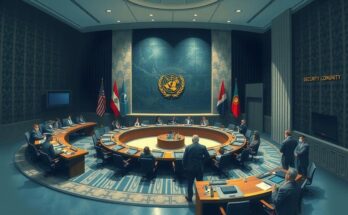Prince Feisal Al Hussein of Jordan is campaigning to become the first IOC president from the Middle East. His candidacy emphasizes the unifying power of sports amid geopolitical challenges. He advocates for inclusivity in athlete participation and a flexible Olympic calendar to address regional climate issues. As he navigates the complexities of gender in sports, his vision seeks to redefine the IOC’s role within a global context.
Prince Feisal Al Hussein of Jordan is campaigning to become the first president of the International Olympic Committee (IOC) from the Middle East. His candidacy, which comes amid geopolitical tensions, positions him as a unique figure within the IOC’s 111 members, as he seeks votes against six competitors. Prince Feisal emphasizes his family’s commitment to public service as a foundational aspect of his campaign.
The prince believes in the unifying power of sports, stating, “We have seen the power of sports in being able to heal, particularly and to bring peace and unity to the world.” His aspirations also target the year 2036, highlighting the challenges posed by hosting the Summer Games in the Middle East due to extreme heat conditions.
Prince Feisal suggests that a flexible approach to the Olympic calendar could benefit potential host countries, stating, “One of the things that I’m suggesting as president of the IOC is to work with international federations to have a bit more flexibility.” This flexibility would encourage broader participation in hosting events globally.
In contrast to his brother, Prince Ali, who oversees Jordan’s football federation, Prince Feisal advocates for inclusivity in sports. He remarked, “I’m not for exclusion. I believe in inclusion,” underlining his stance against barring countries from participation unless they violate the IOC charter.
While discussing the ongoing conflicts in the region, he emphasized that decisions about the displacement of Palestinian people should reflect their desires, reiterating, “It should be what the Palestinian people want, not what the rest of us want.” He remains hopeful for peace, suggesting it is built on justice and fairness.
As vice chair of the IOC’s gender, diversity, and inclusion commission, Prince Feisal commented on women’s sports in Afghanistan, expressing his desire for women’s participation while respecting national sovereignty. He clarified that banning Afghanistan based on gender equality issues would necessitate changes to the Olympic Charter.
The prince advocates for a scientific approach to gender eligibility in sports, challenging blanket bans in favor of allowing respective sports federations to regulate these matters, asserting, “The international [sports] federation is in a far better position to make that determination than the IOC.”
Prince Feisal Al Hussein’s bid for the IOC presidency underscores the intertwining of sports and geopolitics, particularly from the Middle Eastern perspective. His campaign vocalizes the importance of inclusivity and flexibility within the Olympic framework while addressing significant regional challenges. The prince’s vision for sports as a tool for healing and unity may reshape the IOC’s future, especially in terms of hosting rights and gender equality in athletics.
Original Source: news.sky.com




